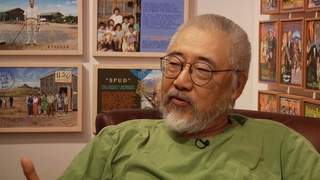Interviews
Ostracized by the camp newspapers
The camp newspaper The Sentinel, they were really bashing us. They were calling us stupid, idiots, uh crazy, you know mad and everything. Because the uh, uh associate editor who was doing writing was a past president of the JACL in Pasadena, Nobu Kawai. And uh, (clears throat) and yeah it was about three four issues there that they were really uhh, calling us all kinds of names. As did the citi- Pacific Citizen, JACL paper. In fact the JACL paper uh, Sabruo Kito I guess was the fellow writing editorials he even went further than uh the government says uh we should be charged with sedition. Which was a more serious charge than draft evasion. That’s why I say the JACL really went out of their way to ostracize us.
Date: May 9, 2006
Location: California, US
Interviewer: Lisa Itagaki
Contributed by: Watase Media Arts Center, Japanese American National Museum










